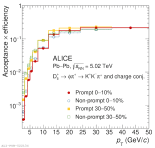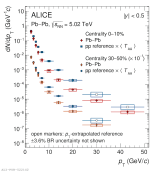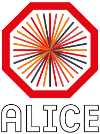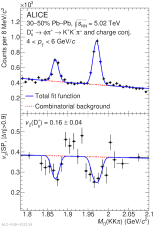Figures from paper submitted to Physics Letters B
Abstract:
The production yield and angular anisotropy of prompt ${D_s^+}$ mesons were measured as a function of transverse momentum ($p_{ T}$) in Pb-Pb collisions at a centre-of-mass energy per nucleon pair $\sqrt{s_{ NN}} = 5.02$ TeV collected with the ALICE detector at the LHC. ${D_s^+}$ mesons and their charge conjugates were reconstructed at midrapidity ($|y|<~0.5$) from their hadronic decay channel ${D_s^+ \to \phi \pi^+}$, with ${\phi \to K^-K^+}$, in the $p_{ T}$ intervals $2<~p_{ T}<~50$ GeV/$c$ and $2<~p_{ T}<~36$ GeV/$c$ for the 0-10% and 30-50% centrality intervals. For $p_{ T}>10$ GeV/$c$, the measured ${D_s^+}$-meson nuclear modification factor $R_{ AA}$ is consistent with the one of non-strange D mesons within uncertainties, while at lower $p_{ T}$ a hint for a ${D_s^+}$-meson $R_{ AA}$ larger than that of non-strange D mesons is seen. The enhanced production of ${D_s^+}$ relative to non-strange D mesons is also studied by comparing the $p_{ T}$-dependent ${D_s^+/D^0}$ production yield ratios in Pb-Pb and in pp collisions. The ratio measured in Pb-Pb collisions is found to be on average higher than that in pp collisions in the interval $2<~p_{ T} <~8$ GeV/$c$ with a significance of 2.3$\sigma$ and 2.4$\sigma$ for the 0-10% and 30-50% centrality intervals. The azimuthal anisotropy coefficient $v_2$ of prompt ${D_s^+}$ mesons was measured in Pb-Pb collisions in the 30-50% centrality interval and is found to be compatible with that of non-strange D mesons. The main features of the measured $R_{ AA}$, ${D_s^+/D^0}$ ratio, and $v_2$ as a function of $p_{ T}$ are described by theoretical calculations of charm-quark transport in a hydrodynamically expanding quark-gluon plasma including hadronisation via charm-quark recombination with light quarks from the medium. The $p_{ T}$-integrated production yield of ${D_s^+}$ mesons is compatible with the prediction of the statistical hadronisation model.
Phys. Lett. B 827 (2022) 136986
e-Print: arXiv:2110.10006 | PDF | inSPIRE







